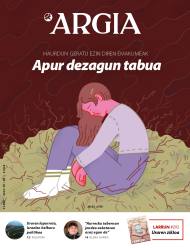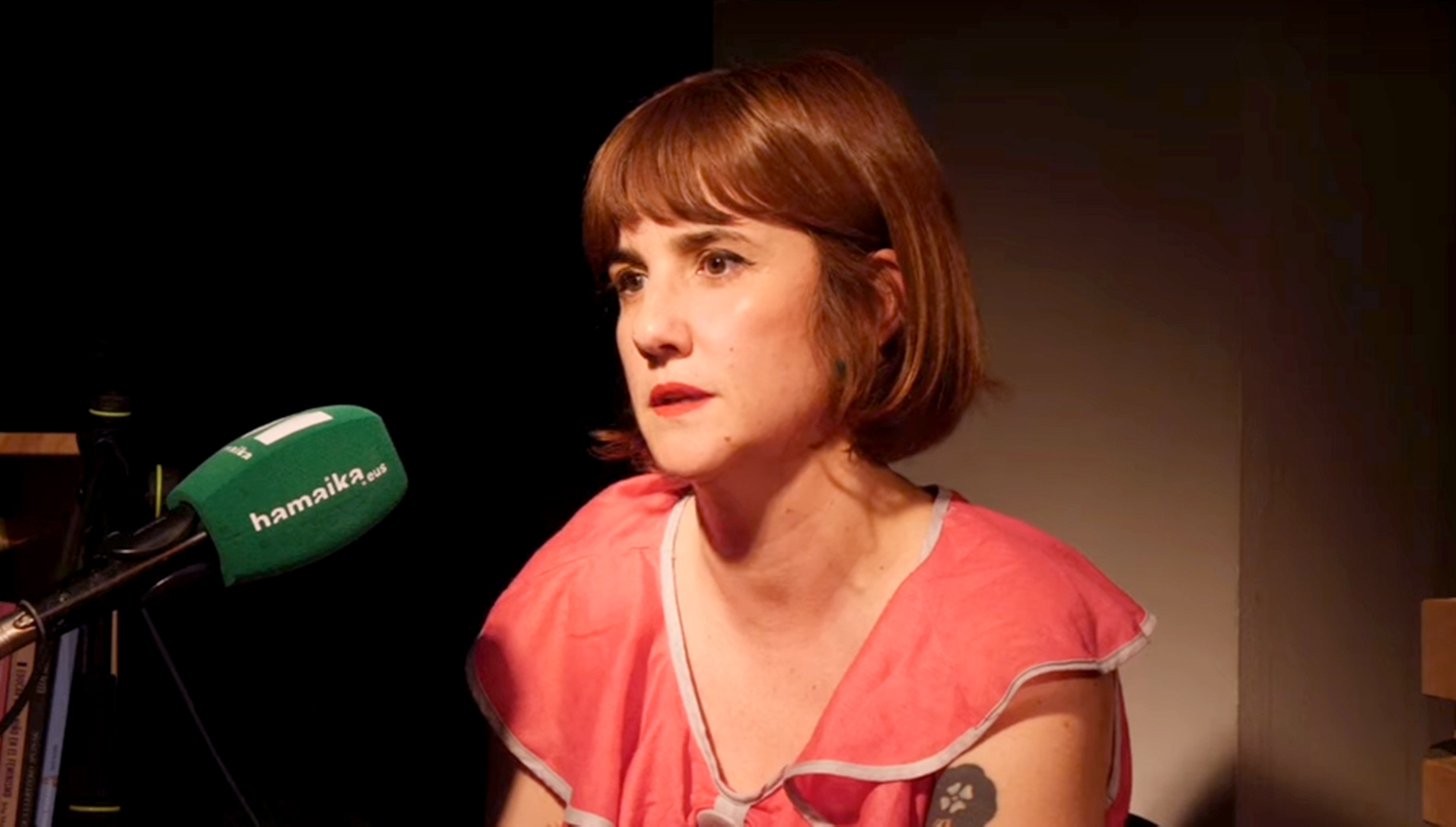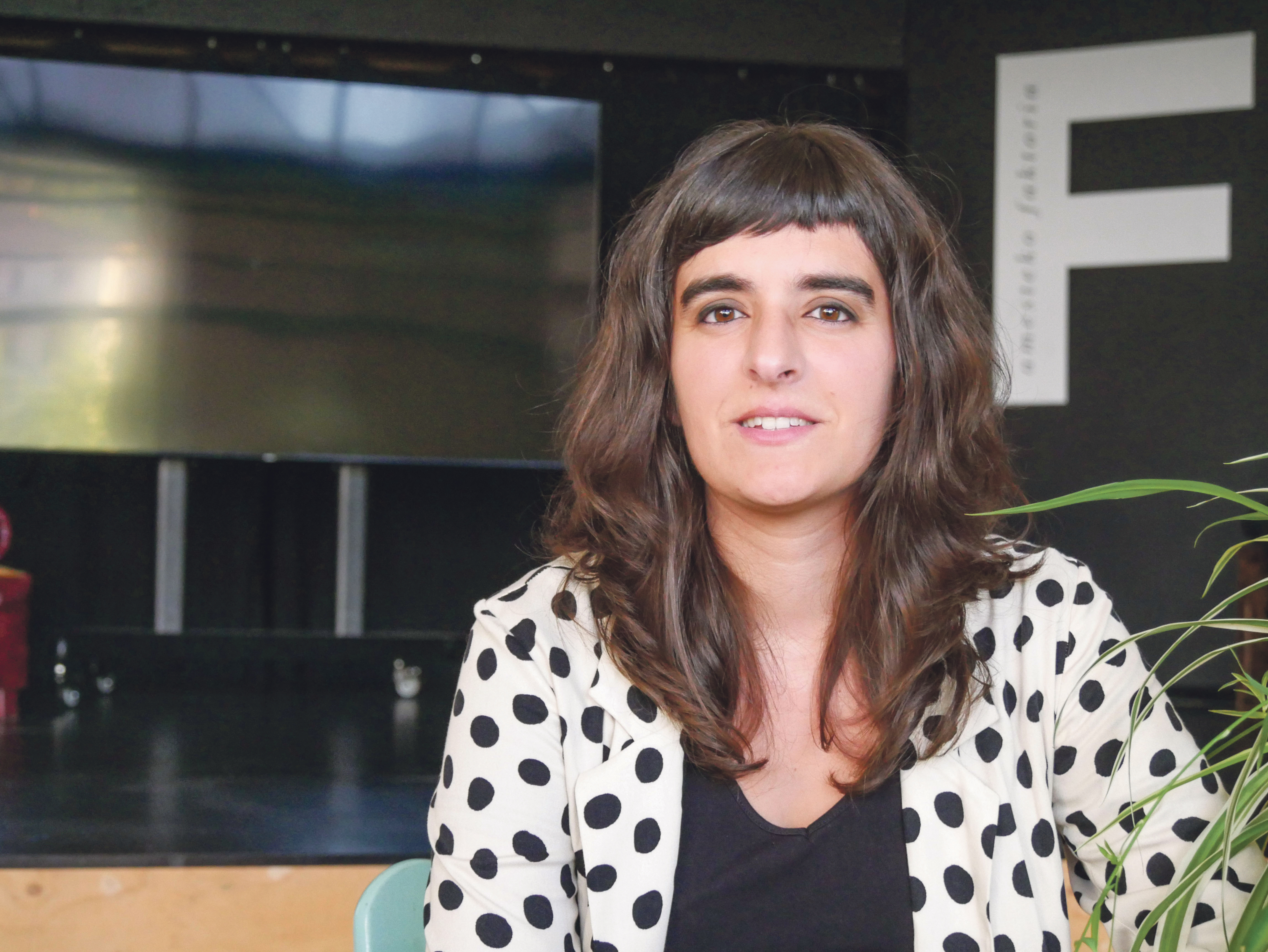A secret mourning to get pregnant
- In a society in which sterility is taboo and stigma, seeking answers to questions: wanting to get pregnant and not being able to get it, attempts are prolonged so far, and in this path there is fatigue, loneliness, guilt, shame, fear, obsession? How does it affect household relationships and their environment? Finding out you're not going to have a child, why is it such a big blow? How do you make room for socially silenced grief, how do you reconstruct the broken illusion?

We have a distorted idea of fertility, because it is a message that has been internalized since childhood that it is easy to get pregnant (“when you are a mother”); moreover, in sex education workshops we are reminded that we must take contraceptive measures, and we have heard stories of unsought pregnant women, that they have had a simple adult, but that they have no problems, that they want to be mothers and have not succeeded. The perinatal psychologist, embryologist and sexologist Nagore Uriarte has highlighted the lack of female referents who have not been able to have children, known women who socialize their experience, who are only to normalize the theme and that the women in this situation do not sit.
We don't think we can't have children, there are also specialized clinics for that, but the reality is that about 16 percent of couples have fertility problems. And yet, the issue remains taboo, as it relates to intimacy and sexuality. “We somehow lived sterility as if we weren’t enough women or enough men,” says Uriarte.
However, sterility is not a rigid diagnosis, people have fertility problems – age is an important factor – and you can try and try, naturally transform into an infinite process, first with medical help. Public health can be used, although waiting lists are very long and for many couples time is the main enemy, so some resort to private clinic. “In most cases, women live from the medical appointment, as if they could do nothing between them, they only survive because desire becomes obsession. How long? The money, the physical and emotional exhaustion, the advice of the doctors... lead, but it is different where each one places, and it is usual to spend years in the process, one cycle of pregnancy after another, in the consultation I have had couples of three, four and five years”, says Uriarte.
The process presents fluctuations and turning points, as in the case of natural abortion, with frequent need for breaks. Isabel Matía Infiles, a member of the Network, exposes her experience in podcasts on the network: “In the specialized clinic we had great hopes, but in the first cycle they were unable to draw any embryo, and it was a great blow. We were not prepared for such a blow and I felt sad. The result of the second cycle was even worse, it was the disappearance of a project, and since we didn't understand anything, the feeling this time was more anger and anger, I was seeking guilt, I was also punishing myself. And I had to stop to breathe, to train myself. In those moments you see everything dark, everything negative, because uncertainty is huge, and I couldn't sleep. Her husband took him in secret, but he also went wrong.” Worst of the process, spending hours and days waiting for a medical call: “It caused me a lot of anxiety, it assumed me and when we started the second cycle I told them to delete my phone number and make calls to my husband, I couldn’t bear it.”
Isabel Matía: "It was the disappearance of a project, and since we didn't understand anything, the feeling was more anger and anger, I was looking for guilt, it was also punishing me."
Alaine Agirre also decided to give pau and stop for a while, “when I started feeling lost”. “The body speaks to us but we do not know how to listen. Fortunately, due to some processes of politicization and therapy, I started listening to body discourse. When I was able to listen to these ups and downs, I began to listen to the inside, to look at the people who did not allow me to feel (no) on the way to my maternity, to live what had happened (although a few years later). Writing the narrative of what I lived helped me, metaphorically and literally: repeating the story to my friends, to my partner, to myself, to my therapist, but also adapting with the hands of the cheeky mechanisms of fiction and creating a piece that was shaped like something of that wild moat. To reprocess the trauma we have to feel those who have been stuck inside us; to heal the wound, one must create a narrative of how what has happened to him has lived.” The writer Alaine Agirre talks about motherhood and not about motherhood and the impossibility of motherhood in her book Karena.
Guilt and fear
In the fight for pregnancy, the feelings that cross are not few. “Fear of not having your child in arms, of not having embryos, of losing... Faced with something so doubtful, how can we not be afraid? Uncertainty, ignorance, the feeling that everything overcomes you, is scary,” says Uriarte.
There is always a sense of guilt. Our individualistic society says that if you try it, and it doesn't have to be that way, but consciously or unconsciously it is often judged by both society and each. “Before I had to inform myself, I had to start trying to get pregnant... Women are experts in self-blame in all areas, let’s not say on this issue, in which women tend to carry more because the social pressure of being a mother is much greater than that of being a parent from a young age”.
Shame or anxiety are also frequent, as well as the feeling that what happens is not fair, as comparisons are dangerous (“although I do all the efforts, I do not, others without taking care of it, with what ease”).
And loneliness is imposed because he has decided not to count (trying to protect himself), or because despite telling him he feels that they don't understand it, or because he doesn't want to be heavy and doesn't talk enough, although he would like to spend all day talking about it. Bringing the process in intimacy or seeking the help of others, what is better? Uriarte says there are no magic formulas if you believe that certain family and friends will be a good refuge, that it is good to count, and if it is not the support and help you need, that it is better not to count. In any case, you have to think well who to say it and under what conditions (“I have fertility problems, but that’s what we’ll talk about when you need it and want it, not every time we get together”).
Alaine Agirre: "What we want or do not want to be parents is not one of those topics of dialogue that is (or we know) easy to sustain. We will not be able to put words to socially silenced tobacco"
For example, for Isabel Matía, it was fundamental to find a support network for women who went through the same process: “At first I thought, what am I going to do with people I don’t know to share my intimacy? In addition, the story itself damages. Well, I said it! Until then, I felt very lost and lonely, and they cleared my way. Accompaniment, the importance of someone listening to you being close.”
Alaine Agirre made no special effort to keep it secret: “If dialogue opened the way there, I would tell. But starting to speak requires knowing how to listen. What we want and cannot be parents is not one of those topics of dialogue that is (or know) easy to sustain. We will not be able to put words to socially silenced tobacco.”
Social isolation away from mothers
In these situations, social isolation is common, sometimes the decision, because we consciously distance ourselves from people who have children, because they remind us of what we cannot remember, and other times we unconsciously leave doing routines and things we like, like going to a cafeteria with a playground nearby. For some women who cannot have children, torture can be surrounded by children or surround children with people who speak for themselves. That’s why, for the woman who is trying, sometimes it can be good to get away from them, because in some attitudes “I’ll make an effort for my friends” can be making a butcher constantly, says the psychologist. To avoid misunderstandings, it would be best to explain the need to move away from friends, but it is often not so clear. Then, surely, you'll want to go back to the group of friends, but taking the step is not always easy, it can make you embarrassed, and many times, without making that trip back, you also live the grief alone after you stop trying.
The key is to talk, but Uriarte says we're emotional illiterate. For example, people who wanted to get pregnant and knew the process did not tell Olatz, who after a few years stopped trying, told us a little surprised Olatz (invented name). According to the psychologist, many times we do not know what to say or how to speak in these situations (after a natural abortion, for example) and we think it is better not to remember the grief so as not to cause more pain, as if not to talk about it did not exist, or as we do not know how to address the issue, “in case” we do not take the issue… In the end, we fear that we do not manage this situation, we do not ask, and live alone. Nagore Uriarte's advice is to encourage his friend a little to tell him if he wants. “Just know how to listen, let him mark the tempos. Listening and not judging is helping.”
Nagore Uriarte: "Women are experts in self-blame, let's not say on this issue, where women carry more, we have more social pressure to be mothers."
On the contrary, we often give good advice to those who are trying it (“relax, when you stop thinking and obsess you will”; “because you are stressed you do not get it”; “eat well, sleep well”, “adopt a child”, “children give a lot of work and you are better”...). Even when the desire to have a child leads to intimacy, the woman has to hear “Have you not thought of being a parent?” “How well do today’s youth live without responsibilities”, etc. Of course, these kinds of tours are only an increase in the responsibility and burden that each one bears.
In the case of a couple, the situation also influences the relationship within the home. The views and limits may be different (economic, physical, emotional...) and some couples enter into crisis, for example, the abandonment of sexual intercourse is common because they have replaced the desire for pleasure by the desire to have a child. Uriarte's experience is that couples attending their therapeutic sessions are reinforced and reinforced in most cases, as the situation increases communication between them.
“So far!”
For most people, it is important to have a child for personal satisfaction, according to various surveys. The pressure and the social-cultural imaginary will influence this perception, also the desires developed by oneself, but it reflects to what extent the blow can be hard for those who realize that they cannot have children. Despite the vital forecasts, the grief of the unfulfilled expectations begins, and the more time he has worked, the harder it is to stop, the greater the feeling of subsequent personal failure.
“It’s the mourning of a loss, of what we thought would be our life and our family, of what it would be,” says Uriarte. In general, we are very bad at understanding duels, even those of death, so let’s think of the most ethereal duels; loneliness and the feeling of incomprehension is accentuated, is a socially misunderstood grief.” According to theory, grief consists of several phases: denial, anger and guilt, sadness, and acceptance. According to experience, the phases do not have to be maintained, we can move from one phase (and from one emotion) to another, live with different intensity, go back or advance by repeating phases...And overcoming grief does not mean that the pain goes: “Over time you can experience pain with less intensity, but grief does not go away, what happens is not forgotten, you learn to live with that grief, because grits are vital scars, they are part of who we are, and therefore they do not disappear, they accumulate,” explains the psychologist. My mother’s husband died many years ago and today he has another partner, but if today he is sensitive he emits some tear, his grief is summed up at specific times and not bad, it is human.”
We are often very good at giving bad advice to those who are trying ("when you're relying on you'll do it"). They only mean an increase in the burden that each carries on
We have asked him what is the key to moving forward and, like Trivial cheese, he has told us that people are plural, that each color is an area of our life (couple, friends, work, hobbies...). “The desire to have a child can be one of the colors, but that color is eating gradually other colors (friends, hobbies…), little by little we are avoiding and forgetting all the aspects that make up oneself and we focus on sterility; it does not happen from one day to another, but gradually, and by the time we realize we have a single color, we have lost other colors that made us be. And we believe that to be multicolored again, we have to fulfill the desire to be parents, that we won't be happy if we don't succeed. In therapy, I try to recover other colors. It is not easy, I am often told that they are not the same person, that they have changed, and that is, we are changing over the years, we are adapting to situations and evolving, and we cannot recover the woman from ten to fifteen years, but we have to recover other areas within us so that not everything is monopolized by sterility”.
Can adoption help fulfill the desire to be a mother? “Adoption is an option that does not have to be shared. Motherhood is not understood by everyone in the same way, some relate it to childbirth, for example. In addition, people who decide to adopt it have many difficulties (they have to wait a long time, there are age limits, if you say you are on fertility treatment they exclude you from the waiting list…)”.
Alaine Agirre also decided to stay forever, “when what I had to pay for the possible prize that could bring me the way became more expensive than that prize possible.” I sought professional support, that of maternity therapists and psychiatrists; “I also rebuilt myself politically, reading Adrianne Rich or meeting in group with other mothers and unimaginable (here too the concept is undiscovered; and what is not named does not exist). This de-construction and reconstruction was the process of searching for my voice and meeting other silenced voices. The real presence of others and others, of myself, time, reading, other supports… and a change of view that each should do if he or she wants. I began to look at other places in my life, to match myself in things that would return me to my place: in the search and treatment of beauty (sitting on the piano, caring for flowers, restoring abandoned chairs…), in the construction of ideas (reading, listening), in the reformulations of love (through very few relationships based on care and safe adherence).”
Counting and sharing what we live with professionals or trusted people is beneficial, but some are able to talk about it in a few months and others need more time, said the psychologist. Furthermore, having a taboo subject makes it difficult to speak naturally about what they live. Now, “living in denial is not a good option; you can decide not to mourn at that moment, but at some point it will surely come when something will happen that reminds me… The ideal would be to experience grief at the right time and accept that there are times of anger, sadness, anxiety…, because grief turns the wound into a scar, and if we do not bring the wound into living flesh”.
Nagore Uriarte: "We are very bad at understanding the duels, even those of death, so let's think of the most ethereal duels; the feeling of loneliness and lack of understanding increases, is a grief that is not socially understood"
Men and masculinity
Women are the protagonists of this report, but Nagore Uriarte has underlined that male sterility is the taboo, as they can be the object of comments and male mockery that question masculinity and masculinity. The data indicate that sterility problems affect women and men in the same proportion, but in specialized clinics, the professional in charge is gynecologist, that is, they focus on women and men only seem complementary, since in most clinics there is no consultation with an andrologist or urologist. “If these consultations were increased, the man would feel that he also takes it into account, and at the same time not all the burden would be thrown on the woman, the burden would be more distributed. On the other hand, the woman is given many tests and the man is only given a seminogram to measure the quality of semen.”

Toledo, 1272-1280. Alfonso X of Castile gathered 427 monomedical songs dedicated to the Virgin. The Cantigas de Santa Maria constitute one of the most important musical and literary collections of the Middle Ages, but being decorated with the miniature cantiga, these... [+]
When death and the corner of the perinatal mourning occurred in the Hernani cemetery, I received the first blow. So I started thinking about where that lost child was. There I left him to take care of others. Why didn't I do something? Time goes fast and immersed in day to day is... [+]
























